Our Educational Games
Wide range of immersive and interesting learning games for our students.
Wide range of immersive and interesting learning games for our students.
Sum Stack is a fast-paced, high-energy arcade game that transforms basic arithmetic into a thrilling construction challenge. The objective is to quickly add numbers presented on blocks to reach a specific target sum, allowing you to successfully place your block and build a towering structure. This game is designed to drastically improve mental math speed and number sense, forcing players to execute rapid calculations under pressure. As you progress, the complexity of the numbers increases, demanding deeper proficiency in addition and sometimes subtraction. The challenge isn’t just about correctness; it’s about speed. Failed calculations lead to block instability, threatening to topple your tower and end the game. Players must strategically choose which numbers to combine and how quickly to react to incoming blocks, honing their focus and quick-thinking abilities. Sum Stack serves as the perfect training ground for foundational math, ensuring that learners achieve automaticity with sums—a key skill for all subsequent mathematical learning. With its engaging, visually rewarding gameplay, Sum Stack proves that mastering addition doesn’t have to be a chore; it can be a monumental, competitive quest. Your goal: build the highest, most stable math tower possible!
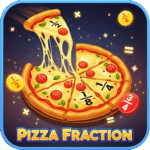
Welcome to the busiest pizzeria in the Math Arcade! In Pizza Fraction, you must become the master chef of division, accurately slicing and serving pizzas based on customer orders. This engaging game makes complex fractional concepts incredibly intuitive and tangible. Each order requires you to divide a pizza into a specific number of equal parts—halves, thirds, quarters, and beyond—and then serve the precise fraction requested, such as 3/8 or 5/6. The visual feedback is immediate and clear: slice incorrectly, and your customers (and your score!) will suffer. As you advance through the levels, you’ll encounter challenges requiring the identification of equivalent fractions and the addition or subtraction of fractions with unlike denominators, all disguised as increasingly complex custom orders. Pizza Fraction excels at teaching the fundamental rule that fractions represent equal parts of a whole. By connecting abstract numbers to concrete, recognizable food items, the game eliminates common confusion and builds genuine conceptual understanding. It’s an effective, delicious way to conquer denominators and numerators, turning every math student into a fractional culinary genius!
Ricochet Rangers is a compelling physics puzzle game where mastery of geometry and angles is the only path to victory. Your mission is to eliminate targets scattered across a complex, walled environment using a limited number of shots. The key lies in understanding how your projectile will ricochet, or bounce, off various surfaces. Players must precisely calculate the angle of incidence and determine the resulting angle of reflection to successfully bank their shots around corners and obstacles, hitting targets that are not in their direct line of sight. Early levels introduce simple 90-degree banks, while later stages demand intricate knowledge of acute and obtuse angles and the concepts of parallel and perpendicular lines. Success requires spatial reasoning, careful aiming, and a deep, intuitive grasp of geometric laws. This game is an outstanding tool for practical geometry application, showing students exactly how the concepts of reflection and angle measurement work in the real world. By visualizing and calculating complex geometric paths, Ricochet Rangers turns every learner into a strategic marksman, proving that geometry is not just abstract theory but a practical skill essential for success.
Shape Shooter is an adrenaline-fueled game that demands split-second recognition of geometric shapes and their properties. In this fast-paced environment, various polygons, quadrilaterals, and other geometric figures fly across the screen, and the player must rapidly identify and “shoot” the target shape based on specific criteria given at the bottom of the screen. Challenges escalate quickly, moving from simple requests like “Shoot the triangle” to complex tasks such as “Shoot the shape with exactly four sides and no parallel lines” or “Shoot the non-convex polygon.” This intense gameplay trains students in visual acuity, quick classification, and instant recall of geometric definitions, making learning highly reactive. The game is highly effective at reinforcing the subtle differences between similar shapes—for example, distinguishing a trapezoid from a parallelogram, or a rhombus from a square. Shape Shooter ensures that students not only memorize definitions but can immediately apply them under pressure. It transforms static geometry lessons into a dynamic, competitive exercise, pushing players to achieve true mastery over the entire geometric landscape. Only the fastest, most knowledgeable shooters will survive and advance through the levels!
In Potion Rescue, you step into the shoes of a magical apprentice whose main tool is mathematical logic. To save the kingdom from a numerical curse, you must brew powerful potions by solving various equations and puzzles that appear on the bottles. This game is an engaging way to practice order of operations (PEMDAS/BODMAS) and numerical substitution. Each potion requires a precise formula—a math problem—and players must correctly calculate the missing ingredient (the variable or the answer) to complete the brew before time runs out. The challenges start with simple addition and subtraction puzzles but quickly scale up to involve multi-step problems, negative numbers, exponents, and roots. Potion Rescue is exceptionally good at helping students develop methodical problem-solving skills, teaching them to break down complex equations into manageable steps. The game’s magical theme and urgent premise maintain a high level of engagement, turning dry arithmetic practice into a heroic quest. Success requires both speed and accuracy, ensuring that every calculated answer is the correct elixir for victory and the salvation of the realm!
Octosolve plunges players into an oceanic world where they must master pre-algebra and early algebraic concepts to help a friendly octopus navigate complex currents. This game focuses squarely on solving linear equations by isolating the variable ($x$). The puzzles are presented as equations spread across the octopus’s environment, and players must perform the necessary inverse operations—addition, subtraction, multiplication, and division—to balance the equations and determine the correct value of the unknown variable. As levels progress, the equations become more sophisticated, introducing variables on both sides of the equal sign, the distributive property, and problems involving grouping symbols. Octosolve brilliantly teaches the foundational principles of algebra: that an equation is a balance, and whatever action is applied to one side must be applied to the other. The game’s intuitive interface allows players to visualize the operations, reinforcing the core rules of balancing. By providing immediate feedback and a structured increase in difficulty, Octosolve effectively removes the intimidation factor often associated with algebra, turning equation-solving into a rewarding and critical marine exploration skill.
Maze Runner is a captivating adventure game that blends navigational skills with the mastery of roots and radicals. The primary objective is simple: guide your character through a sprawling, complex maze to reach the final exit door. However, the path is blocked until you successfully collect three required keys scattered throughout the environment. Each key is guarded by a challenging math problem focused exclusively on square roots and cube roots. Players must quickly and accurately calculate the value of expressions involving perfect squares, perfect cubes, and sometimes their inverses, demonstrating a solid foundation in radical concepts before earning the key. This structure ensures that learners aren’t just memorizing formulas but are applying their knowledge under the mild pressure of the maze. The game provides a compelling, narrative-driven reason to practice root calculation, turning abstract mathematical operations into essential tools for progress and escape. Maze Runner transforms root practice into an adventurous quest, where your mathematical precision directly determines your freedom from the grid!
In Percentage Pipe Flow, players take on the critical role of an engineer managing a complex fluid delivery system. The challenge is to calculate and adjust the flow rate through various pipes using percentages, ratios, and rates to ensure the correct volume of fluid reaches the output container. Each pipe segment may increase or decrease the flow by a specified percentage (e.g., a $25\%$ increase or a $10\%$ reduction), requiring players to quickly calculate percentage changes and apply those changes sequentially. This game is an outstanding, practical application for converting between percentages, decimals, and fractions, and for understanding the concept of compound percentage change in real-time. Players must solve problems like determining the original volume given the final volume after a series of percentage adjustments, or calculating the necessary adjustment to hit a specific final percentage. Percentage Pipe Flow effectively removes the abstraction from percentage math, demonstrating its necessity in real-world scenarios like engineering and finance, all while keeping the gameplay engaging and visually dynamic.
Angle Rocket is an interstellar geometry game where precise calculation of angles and trigonometry is the only way to launch successfully. Players are tasked with aiming a rocket launcher to hit targets across a star-studded sky, but success depends entirely on setting the correct launch angle. The game introduces fundamental trigonometric concepts by providing necessary distances (sides of a right triangle) and challenging the player to calculate the missing angle using sine, cosine, or tangent principles. As you move to higher levels, Angle Rocket introduces more complex concepts, such as angles of elevation and depression, and navigating obstacles using compound angles. This game provides a crucial visual and spatial context for trigonometry, connecting the abstract ratios to the physical act of aiming and firing. It trains students to apply geometric theorems and trigonometric functions efficiently, strengthening both their computational skills and their spatial reasoning. Angle Rocket turns trigonometry from a theoretical subject into an essential skill for cosmic navigation, ensuring that players master every degree and radian needed for a perfect trajectory.
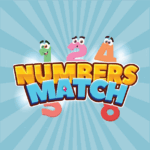
Number Match is a dynamic, match-3 style puzzle game (like Candy Crush) built entirely around number classification. Before starting a round, players must choose which of the six main number types they want to focus on: natural, whole, rational, irrational, integers, or real numbers. The game then presents a grid filled with various numerical expressions, including fractions, roots, decimals, and simple equations. The objective is to swap adjacent tiles to create rows or columns of three or more expressions that all belong to the chosen number type. For instance, if you select Integers, you must match expressions that correctly evaluate to an integer. If you choose Irrational, you must match non-repeating, non-terminating numbers like $\sqrt{2}$. This unique mechanic forces players to constantly analyze and categorize numbers in real-time, strengthening their fundamental understanding of the number system hierarchy. As the levels progress, the expressions become increasingly complex, demanding instant and accurate classification under pressure. Number Match effectively transforms number theory into a compelling, fast-paced puzzle, ensuring that players achieve fluid mastery over how numbers are defined and grouped.

Polygon Pro is the ultimate geometric challenge, requiring players to become experts in drawing, classifying, and manipulating polygons based on specific constraints. The game presents a series of design challenges where players must construct a polygon using a set number of sides or vertices while simultaneously meeting geometric criteria, such as a specified area, perimeter, or even internal angle measures. You might be asked to construct a regular octagon with a perimeter of 40 units, or an irregular quadrilateral with exactly two acute angles. This active, construction-based approach forces students to engage deeply with the precise properties of shapes, moving beyond simple memorization to genuine spatial reasoning. The game effectively covers the entire taxonomy of polygons, from basic triangles and quadrilaterals to complex $n$-gons, reinforcing concepts like concavity, convexity, and rotational symmetry. Polygon Pro provides immediate feedback on construction accuracy, allowing learners to experiment and quickly grasp how adjustments to sides or angles affect the overall figure, turning abstract geometric rules into rewarding, creative design problems.
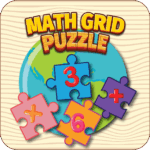
Arithmetic Grid Puzzle is a powerful logic and calculation game that serves as a highly engaging alternative to traditional Sudoku. The objective is to fill a grid of cells with numbers, satisfying a variety of horizontal and vertical arithmetic constraints. Each row and column in the grid is defined by a specific equation that must be solved using the numbers within those cells. The game integrates all four basic arithmetic operations (addition, subtraction, multiplication, and division) and requires players to use logical deduction to place the correct numbers where they belong. The puzzles start simply but quickly scale to complex grids requiring the strategic use of order of operations and the recognition of multiple possible solutions before finding the definitive fit. Arithmetic Grid Puzzle is exceptional for developing deductive reasoning and simultaneous equation processing in a visual, non-algebraic format. It trains the brain to manage multiple constraints at once, providing a profound boost to mental agility and foundational calculation skills. Every successful completion proves that logic and arithmetic go hand-in-hand in solving complex, interconnected problems.
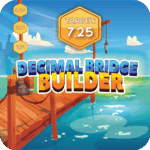
Decimal Bridge is a crucial platforming game that solidifies the player’s mastery of decimal values and place value. The objective is to construct a safe bridge across a chasm by correctly ordering and placing decimal blocks. Each block is labeled with a decimal number, and to successfully build a stable path, players must quickly compare and sequence these values from least to greatest or vice-versa. Challenges increase as the decimals extend to the hundredths, thousandths, and beyond, demanding deep attention to place value. The game is exceptionally effective at tackling the common misconception that longer decimals are larger—for example, distinguishing between $0.5$ and $0.45$. Decimal Bridge requires players to perform rapid mental comparisons and estimations, strengthening their number line sense for non-whole numbers. Later levels introduce operations like rounding or addition of decimals to calculate the necessary length of the next bridge segment. By turning abstract comparisons into a hands-on construction challenge, Decimal Bridge ensures that learners achieve reliable fluency and confidence when working with all forms of decimal notation.
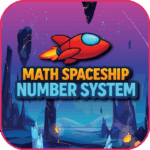
Space Number System is an exhilarating, endless space runner that demands sharp focus on number bases and classification. In this high-stakes game, you pilot a futuristic spaceship through an asteroid field where floating items represent numbers in various bases (like binary, octal, or hexadecimal). Before launching, you select your target: one of the six key number systems (e.g., Integers or Rational Numbers). As you fly, your mission is to collect every item that correctly belongs to your chosen system while avoiding all hurdles and obstacles that represent the wrong type of number. The pressure is constant, forcing players to perform rapid, continuous mental conversions and classifications to ensure they grab the correct numerical objects. This active, reflexes-based gameplay transforms the theoretical concept of number sets and place value into a dynamic survival challenge. Space Number System effectively builds the mental agility required to instantly recognize and distinguish numerical values across different bases, making complex number theory an essential, thrilling skill for cosmic navigation.
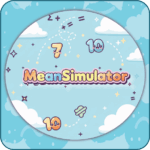
Mean Simulator is a data-driven strategy game that casts players as analysts tasked with managing and interpreting evolving data sets. The core challenge revolves around calculating the mean (average), median, and mode of groups of numbers under various constraints. You must quickly determine how adding or removing a data point affects the overall average, which is crucial for meeting certain statistical targets. For instance, you might be challenged to find the missing score needed to raise a team’s average to a specific number. This game provides a highly practical application of statistics, making the concepts relevant to real-world scenarios like sports analysis or resource management. Mean Simulator requires both quick arithmetic and logical thinking to solve problems related to frequency distribution and central tendency. It’s an invaluable tool for mastering the fundamental principles of descriptive statistics, ensuring that students can easily manipulate data sets and accurately interpret statistical results. Success in this game is achieved by consistently demonstrating mastery over data analysis and calculated average manipulation.
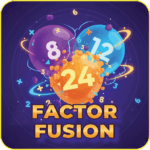
Factor Fusion is a vibrant, balloon-popping puzzle game centered entirely on factors, multiples, LCM (Least Common Multiple), and HCF (Highest Common Factor). The screen fills with balloons labeled with various numbers, and players must quickly pop them based on the current challenge rule. One challenge might require you to pop all balloons that are prime numbers, while another demands you pop only those numbers that are common multiples of 4 and 6, forcing you to find the LCM. Advanced levels introduce the concept of HCF by requiring players to identify the largest number that divides into a specified pair of numbers. The game’s fast-paced, visually engaging mechanic transforms the abstract relationships between numbers into a fun and reactive sorting task. Factor Fusion reinforces number theory fundamentals, strengthening the player’s ability to decompose numbers and understand divisibility rules. By providing instant, clear feedback on which balloons meet the criteria, the game guides students toward a deep, intuitive understanding of how factors and multiples define number relationships, making complex number theory both accessible and addictive.
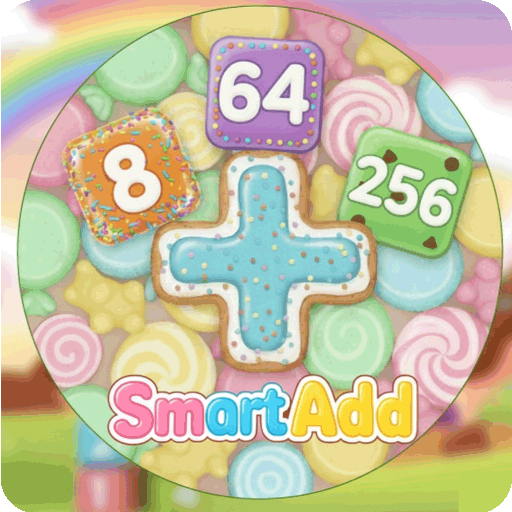
SmartAdd is a fast-paced math game designed to make practicing addition both exciting and meaningful. As part of the Mediatiz Math Arcade, it focuses on helping players strengthen mental arithmetic through quick challenges that gradually increase in difficulty. The gameplay is simple: solve addition problems as quickly and accurately as possible before time runs out. This structure encourages players to think faster, react confidently, and develop a strong sense of number fluency.
The game begins with easy sums to build comfort, then introduces larger numbers and trickier combinations to keep the experience engaging. SmartAdd’s smooth interface, clear visuals, and immediate feedback make it approachable for learners of any age. Every correct answer feels rewarding, while mistakes become opportunities to improve without pressure.
SmartAdd works well as a warm-up activity in classrooms, a home practice tool, or a personal brain-training routine. It offers replay value by motivating players to beat their previous scores and continuously improve their speed. By blending learning with arcade-style fun, SmartAdd transforms everyday addition into an enjoyable challenge that supports long-term skills in math. It remains a simple, accessible, and motivating way to practice essential arithmetic skills daily for players of all levels and backgrounds everywhere today.